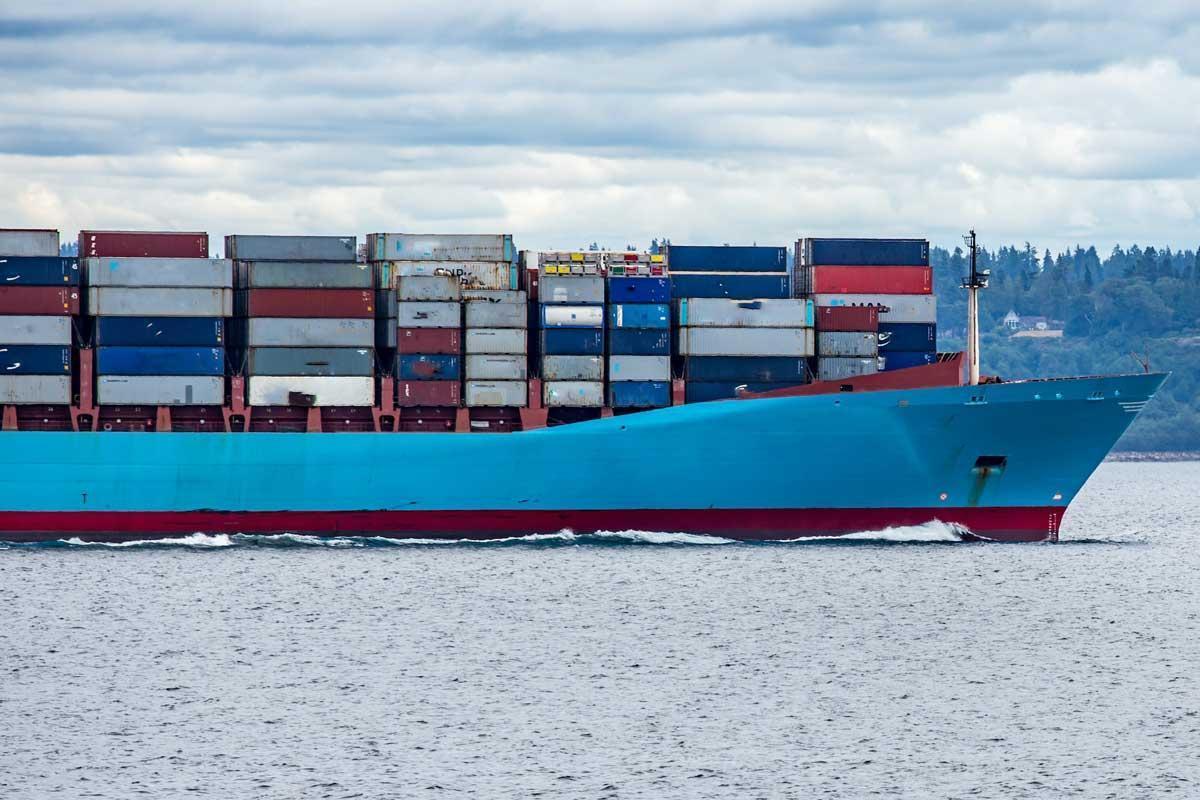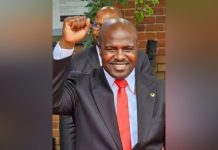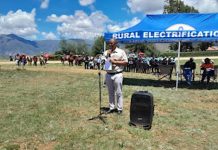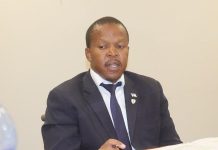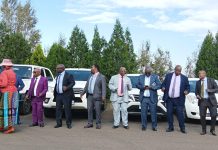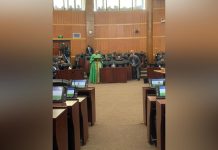Africa-Press – Lesotho. With geopolitical situation heightening, trade wars are also becoming increasingly prominent. By a simple explanation, a trade war is an economic conflict often resulting from protectionism in which states raise or create tariffs or other trade barriers against each other.
The United States and China have locked horns in new trade wars, Donald Trump is targeting Africa with new measures relating trade, and as a mechanism to control Africa.
In this insightful interview by editor, Kester Kenn Klomegah, early April 2025, Professor Byelongo Elisee Isheloke, Rector of the L’université Espoir du Congo (UEC), offered insights into multitude of questions of external partners, particularly United States with Africa.
Here are the interview excerpts: PRESS:Donald Trump’s ascension to power is marked by a combination of policy contradictions and complexities, especially dealing with both U.
S. allies and foes in different regions including Africa. What are your arguments that Africa Growth and Opportunities Act (AGOA) expires in September 2025 and its indefinite suspension may seriously impact on Africa?
Professor Byelongo Elisee Isheloke: It is a well known fact that Donald Trump is controversial in his policies and personality as a character. The former U.
S allies and foes do not know anymore whether to support his views in loyalty to what had been their agreement or publically oppose him as we have seen after the televised debate with president Volodymyr Zelenskyy of Ukraine.
Whether Zelenskyy or Trump was right, I don’t want to delve into that space but to observe that former allies publicly supported Zelenskyy to the point of deciding to help militarily Ukraine in case of U.
S refusal to allow continuity of unconditional support. It is obvious that Trump will cut the traditional U. S-Africa ties with his America policy as opposed the biblical principle of love your neighbor like yourself.
The irony of it, Trump proclaims the Bible when it fits his cause but would not hesitate to literally kick out Africans and other foreign nationals from the American soil, albeit when stopped by the Senate, or House of Representatives or by the U.
S. laws. On the afternoon that he took office, Trump signed a 90-day suspension of all foreign development assistance, engaged in the process of withdrawing from the Paris Climate Agreement and Wotld Trade Organization (WTO). Moreover, Africa was going to be threatened by sanctions imposed on warring armies, to name but a few.
It is hard to comprehend why President’s Trump advisers fail to show to him timely that Africa offers an extraordianary opportunity for the United States on account of growth in markets and consumers as the Senate Foreign Relations, Secretary of State Marco Antonio Rubio, once testified. If Africa will account for one in four humans on earth by 2050, it is a bit shortsighted not to focus on Africa in terms of trade and development.
If in addition, you consider the fact that the population is aging fast in the more secular western world, in wealthy nations including Japan, the youth of Africa constitute a reservoir for the development of the industrialized countries, except when the mechanization/robitisation of industrial activities takes precedence over human capital as a workforce.
Even to the extreme, the economy will need people around to programme, repair and re-engineer the entire systems where necessary for smooth operations and success. Failure to do so will be a recipe for chaos going forward.
I agree with Cory Anthony Booker, the senior United States senator from New Jersey, when he underlined the fact that the lack of focus on Africa can endanger the whole planet. It will be irresponsible to isolate the U. S from Europe, Africa and the rest of the continents.
In Africa, the reactions of leaders will always wait for far too long either for the traditional timidity of the African Union (AU) and its Member-States, with a bit of exception when it comes to South Africa on the issue of Ukraine, but mainly on the Israel-Palestine war and the BRICS embrella organization.
This has not always been the case, if we look the way Africa betrayed itself by keeping quiet when the Arab State of Libya of Muammar Muhammad Abu Minyar al-Gaddafi, a country in the Maghreb region of North Africa, was attacked by the U.
S. , assisted by France leaving it in a chaotic state following years of civil war and tribal conflicts. I think it is time Africa regain its common voice and paves the way to a more unified and stronger African Union (AU) as it was supposed to be according to the forefathers of our independence and freedom.
An Africa, at peace with itself, is an Africa which can experience trade and economic development to flourish and largely benefit the majority, if not all, its inhabitants, blacks including Arabs and the mixed race as well as whites.
Africa will only be free when all its nations are dixit our heroes, for example, Nkwame Nkrumah and Julius Nyerere. When people of African origin voice out their anger against an African nation, it is a betrayal to the motherland to say the least.
I would love to see African to team up in fighting poverty, unemployment/inequality and crimes, by promoting entrepreneurship, engage in networking for expertise exchanges on technology and innovative ideas in all aspects of life.
Seeing the people of African origin to the service of so called super powerful nations is selfishness and a total disservice to the African continent.
As far as I am concerned, the Africa Growth and Opportunities Act (AGOA) which is going to expire in September 2025 should be renewed, as it has been the case before, otherwise it will impact so negatively on Africa, if suspended for a long time.
Why would President Donald Trump suspend such a useful plan only for his 4-year second term in office if after him it will probably going to be reintroduced again? I think this instability or uncertainity is not helping both Africa, the United States and the rest of the world for the economy needs consistency and stability to thrive.
It took China, at least, three decades of consistant growth and, at least, over 10 years of a 10% growth in the GDP to turn its economy into a world class one that we know today.
Africa must learn and unlearn from the experience of the past, respectively success stories and failure, and seek to address core issues by emulating and innovating based on the experience of others, for example the free world.
Having said that, Africa must stand on its feet. It is time we learn to create our markets, both domestic, regional and continental with ramifications to international trade and cooperation.
What is lacking to Africa with all its resources and potential, as the youngest continent in terms of population and the most resourceful continent on the account of minerals and natural resources, including diamond, gold, uranium, cobalt, coltan, lithium, cassiterite, copper and platinum? Africa, being the first lung of the planet earth after the disaster that affected the Amazonia, especially in the equatorial forest but not only, where the bog earth allows our planet to breath in and out, thus benefiting the so called first world environmentally whereas they are responsible for the speeding pollution of earth and the effects thereof, such as climate change, over-heating of the planet, causing floods, and to some extent, the water overflow of the lake Tanganyika.
This has a devastating impact on the livelihood of the population who barely plant, fish and live in the vicinity of the lake Tanganyika. Just like the Nile has been known to be the gift of Egypt, the lake Tanganyika has been the gift of many people living around in the Great Lakes region.
The problem to creating a viable market is to have the will to do so but to also have the power to do so. Africa needs visionary leaders and workaholic people willing to materialize the visions and plans of development.
Barriers to this, historically, have been the refusal of the WTO and the imperialists, multinational corporations with economic interests in Africa. For example, they wouldn’t allow that mineral beneficiation takes place in the continent, and when the third world delved into trying just that, those companies and their lobbies will veto against such a move.
It will take re-organization or better say re-engineering of the whole economic system and the consolidation of all the forces of Africa to do this successfully.
In addition, Africa needs to be capacitated with electricity provision, water, internet and technology and more human capital to strive and thrive in manufacturing, innovation and economic development. Good partners of Africa will always be found to support this cause from the free world.
A multipolar initiative towards achieving this, should be advocated by all going forward, and attempt to deal with reformed financial institutions and/or the BRICS (Brazil, Russia, India, China and South Africa) as well as Pan-African organizations should be promoted.
Now talking about AGOA, I can say that the diplomatic tensions between South Africa and the United States are not helping, considering that the Republic of South Africa is one of the major beneficiaries of that programme and a meaningful economic partner in the continent for the United States.
These tensions stem from the advocacy of South Africa for the free Palestine just as the RSA tried to help in preventing the M23 from gaining terrain in the eastern DRC, when it is known that some western pro-Rwanda lobbies are against that stand.
The issue of constitutional land expropriation without compensation is another hot potato that the two administrations must address in finding a common ground, thus furthering cooperation on trade and development.
In all the issues above, South Africa ought to do the right thing, support human rights and justice for all not only on the African soil but also abroad.
South Africa condoning what Russia, China and Iran, to some extent, does the hostility towards the policy of the Israel that many Republicans and Democrats alike tend to favour, in agreement with the President Donald Trump’s policies, the suspension of RSA from AGOA, according to Peter Fabricius, a writer and foreign policy analyst for the Daily Maverick, a leading South African newspaper.
Currently, South Africa is viewed as a threat to U. S. foreign policy and national interests and thus violates the country’s eligibility for AGOA. As far as I am concerned, I think excluding South Africa out the AGOA is a mistake as industrialized countries should bridge ties rather than cutting them off.
According to Rosa Whitaker, a former US trade official and a CEO of a consulting firm that advises on trade and investment in Africa, and also a board member of the US Chamber of Commerce, AGOA waived duties on most commodities from Africa in order to boost it in the U. S market.
Rosa Whitaker acknowledged that this in practical terms and as a result, raised the standard of living of millions of African population since the year 2000, at a fraction of the cost of formely given aid and in a way that did not jeopardize American jobs, albeit in the aid industry.
PRESS: Under the shifting circumstances, majority of African countries has to redirect trade to Asian region, what challenges await potential African exporters in this market, and how easy would it be to settle or make payments without the denominator – the U.
S. currency, as they advocate for de-dollarization? BEI: If African countries in their majority redirect trade, as a strategy, to the Asian region, either in the context of the BRICS platform, like do as well the tiger nations and other emerging economies, can be considered understandable.
However, this should not be perceived as the lasting solution, it doesn’t solve a lot if anything. We live in a world which calls for a multipolar system where there will still be a place for the western nations to trade and cooperate with others.
What needs to be addressed is the reforms of the Bretton Wood institutions like the World Bank and the International Monetary Fund (IMF), but also reforms of World Tratde Organization (WTO) which risk to be controlled by pharmaceuticals to the detriment of its mission in service to humanity.
There are many other organizations including the United Nations Organization with its UNHCR and many other global organizations that could be reformed for a better service to humanity.
For potential African exporters in the market, there are a myriad of challenges, first the vision, the political and policy formulation and implementation, the creation of wealth on the continent through public-private partnership, entrepreneurship, manufacturing, investment in science and technology, and above investment in the youth.
I do not think Africa can thrive on the global scale, if we are still struggling to do business within the continent for the lack of political will, vision, infrastructure, social cohesion, regional integration and capital.
Resources are the potential for development, but they need to be used optimally in a way that adds value and further creates wealth. Minerals need to be transformed if not locally, at least in the region or in the continent to a large extent, except when it is sound and more profitable to do so outside the African motherland.
When wealth is created, it must be redistributed fairly to diminish the effect of social inequality and its consequences. This must become a circle and to do that Africa needs to invest in circular economy.
The future is not only Africa but the world is on recycling, reusing, reducing and re-engineering, owing to the fact that resources and minerals deplete.
Now, I don’t think it is time to completely ‘de-dollarize’ the economy neither for Africa, the BRICS and the rest of the world, but I think the process should start now.
It is known that the current dollar-dominated economic system favours the U. S to the detriment of the rest of the world. It has been so for centuries and to change that, we better be prepared as it may be another recipe for war, not only trade war, but war in the literal sense of the word.
You need to overpower the strong man before taking control over what has been his. Reorganization of the BRICS in trade and cooperation as an alternative to the Bretton Wood institutions seems to be one of the ways that will pave the pathway to the ‘de-dollrization’ of the system going forward.
I think the idea of having the BRICS currency, as we have Euro for Europe or I would predict Afro for Africa, could take us a long way in stating to appreciate the replacement of the dollar in the future.
I believe the U. S. should be engaged in an international conference about the injustice that all endures by accepting trade in dollars. Maybe, the U.
S. can accept and participate in some concessions for peace to prevail and dollar to be progressively replaced on the global market. It must be a careful and progressive process.
Any brutal attempt to chance the currency domination of the dollar is an act of provocation and maybe could be perceived as a call for disputes if not war.
There will be no trade and development in war, except for ammunitions and except that which benefit only the few multimillionaires. I call for an international conference to address this on continent-to-continent basis and if need be engagement with the U.
S. directly in finding feasible alternatives. I know that sovereign countries want to do their own things but it is more responsible to use diplomacy to address the issue on gradual basis.
Why does Africa not integrate even on regional basis? Why do we have even regional currencies to start with? These are the questions that our economists must help the government officials to answer before actions could be taken.
Whether the BRICS should de-dolarize tomorrow already is another question which we could discuss another day. There is substance in doing so but the terrain must be prepared and the people, both on the ground and on the leadership, so that all can speak with one voice.
PRESS: Can African countries avoid being ensnared by Donald Trump and his new official African policy if they instead focus more on formulating strategies for improving intra-continental trade, the African Continental Free Trade Area (AfCFTA)?
BEI: We should not say that, all that Donald Trump does, if wrong or a bliss for Africa. You will be surprised how some of the policies that he defends are applauded on the continent, especially those in line with some biblical principles.
The past administration that supported many wars in the world, in almost an hypocritical fashion, is to blame for this. Many Africans applauded President Trump on his victory with the Republicans.
Little did the people know that the president will sign into law many decrees against foreign nationals and against international trade, and will threaten certain nations just after his inauguration.
Today, many people don’t know what to do, either to support what he does or not. But I think Donald Trump is not against intra-continental trade, if he advocates an America first policy, surely he will condone with others also to do their own things.
As I said before, this is a mistake, as we are called to live in a more multipolar world where isolation is counter-productive. The intra-continental African trade, the African Continental Free Trade Agreement, the famous AfCFTA, is a good project and should be upheld by all.
This however must be coordinated well, and I suggest integration and cooperation starts at regional level before it goes to the entire continent. Regional organizations have tried this in Africa but the process is very slow because of greed, discrimination and lack of visionary leadership. This also was the fate for the New Partnership for African Development, the NEPAD.
Integration in the East African community, for example, is to be questioned with the war in the eastern DRC where the Rwandan regime of Paul Kagame, a politician and former military officer who has been the President of Rwanda since 2000, and other countries of that region are involved despite being part and parcel of the same organization.
Little integration is also witnessed in the SADC region, as people to people trade but aspects of cooperation are restricted for visa issues and the likes.
With all that in mind, when will Africa as a continent going to integrate, promote trade and economic cooperation, investment and development in her midst?
PRESS: Do you think trade and foreign investment are at the cross-road, with risks and/or opportunities, as Africa continues to experience instability? What do you think of the current status of the African Continental Free Trade Area (AfCFTA) today, within the context of U.
S. global trade wars? BEI: In fact at this point our discussion, to continue talking about the United States and Africa, let’s see the relation between Russia and Africa, and to some extent, with China as far as trade and economic cooperation are concerned.
Russia has helped Africa mainly in its political and, to some extent, its military or armed struggles. Little did Russia do, albeit recently, on investment in trade and economic development.
Compared to the United States and Europe, Russia did very little after the Cold War and it is doing little even today in Africa. Russia’s economic presence is invisible across Africa.
Nevertheless, the slavery and colonial past of Europe in Africa, the imperialist approach of the U. S. and its hegemonic stand triggered African leaders to turn to Russia and to China for cooperation.
What Africans are calling for is a more just and fair system in trade and development. The Bretton Wood institutions must be reformed, the UN, the UNSC, the WTO and the likes must all be reformed for a win-win relationship.
Failure to do this, will encourage African states to turn to alternative institutions or organizations such as the BRICS, the G20 and the likes, all which also need some re-organization, in order to move forward.
Nevertheless, Africa should not blame others for its flaws. Corruption is a cancer which will decimate Africa if nothing is done to stop it. A few years ago, over US$50 billion were lost to Africa as result of corruption, money laundering, racketeering as well as issues such as maladministration and mismanagement of funds and cash equivalents. Reforms are needed to also drastically address the flaws in the banking sector to benefit trade and investment in Africa.
Now to revert to your question, I agree that Africa is at the cross-road, with risks and opportunities owing to the endemic instability especially in the Great Lakes region, in Mozambique – a SADC Member-State, in the Sudan and in the NorthEast of Africa where there are either war or pocket of conflicts and the African Union (AU) and the UN seem to be overwhelm, while the BRICS countries sit and watch this theatrical drama.
For trade and investment and development to thrive, Africa needs peace and stability but even in time of war and conflict something must be done. Peace-keeping initiatives must be undertaken, assistance to the destitute is the right thing to do, some investment in social cohesion, and building infrastructure where possible should be initiated.
Calculated risks must be taken in investing in the people and the nations, these become opportunities for future growth of the economy in times of reconstruction.
Trade and development cooperation should be the backbone our economic endevour going forward. I think the AfFTA must now be reviewed and renegotiated to allow advancement on regional level and pave the way to progress on continental stage.
Engagement with both the western countries and the BRICS is what Africa needs in striving to thrive. Therefore, African leaders should stop geopolitical discrimination, a multipolar means all inclusive and unified world.
Trade wars between the west and the Asian economies as well as African interests are unavoidable but it is possible to use a well-formulated and refined diplomacy in addressing these matters to avoid further an escalation into a real war.
Modern Diplomacy
For More News And Analysis About Lesotho Follow Africa-Press

